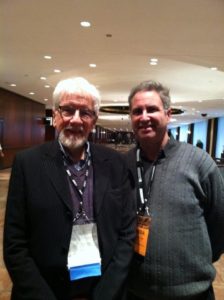Robin Morton, who played an integral and pioneering role in traditional Celtic music as a founding member of Boys of the Lough, manager of Scotland’s Battlefield Band, avid song collector, and founder & owner of the Scottish label Temple Records, died on Oct. 1, 2021. He was 81.

Robin Morton (l.) with Michael Kornfeld during the 2013 APAP Conference in New York City (Photo: John Chicherio)
Born on December 24, 1939, Robin Morton grew up in Portadown, County Armagh, Northern Ireland. His dad was a jazz enthusiast and turned him on to jazz as a child. Morton tried to play the cornet during his youth and also developed an interest in skiffle music before The Liverpool Spinners, among others, began to spark his interest in folk music around 1959. He regularly watched the weekly Hootennny TV show that emanated from Edinburgh, Scotland and featured such folk artists as Martin Carthy and Archie Fisher. While living briefly in Manchester, he also picked up the guitar around that time.
After returning home to Portadown, he began frequenting a nearby pub, where he’d occasionally sing traditional songs during singer sessions. Later, while at Queens University in Belfast studying social work, Morton became involved in the Glee Club led by Phil Coulter, in whose shows he performed a few times (primarily Woody Guthrie songs). He also launched a folk society there in 1963, although he left it and the university after a year to continue his studies at London School of Economics. While in London, he befriended Ewan MacColl, who helped to spur his interest in collecting traditional folk songs.
Upon returning to Belfast, Morton worked in child psychiatry for a while and also helped to launch the Ulster Folk Music Society. He sought to pair music and song together, rather than just separate instrumental and singing sessions, as was the norm. It was through the folk music society that Morton met Cathal McConnell and Tommy Gunn. The three would launch the traditional Irish folk group Boys of the Lough, named after a reel that they enjoyed playing, in 1967. MacColl and Peggy Seeger arranged the band’s first tour. Morton performed and toured with the seminal band, through various personnel changes, for a dozen years.
Morton also collected songs from Ulster and compiled them in a book entitled Folk Songs Sung in Ulster that was published in 1970, along with two albums featuring recordings of traditional singers. Late that year, he moved to Edinburgh.
During the late 1970s, Morton, who had previously worked as a producer for Topic Records, opened a recording studio and established Temple Records, a label devoted to acoustic Scottish (and some Irish) traditional music. Based in a converted church in the village of Temple, near Edinburgh, the label’s mission is “to release music that reflects a great, proud, timeless tradition.” Its first album was Alison Kinnaird’s The Harp Key (1978). Temple Records has released a number of classic, groundbreaking and seminal recordings over the years by such artists as Marie Ni Chathasaigh, John McCusker, Brian McNeill, Flora McNeill, and Christine Primrose. But, perhaps, the most notable act on its roster is Battlefield Band, a group that Morton also managed for more than 40 years — until his passing.
Founded in 1969 and performing under the banner “Forward with Scotland’s Past,” Battlefield Band performs an inspired mix of ancient and modern traditional music and songs. “What the internationally renowned Irish band, the Chieftains, have done for traditional Irish music, Battlefield Band are doing for the music of Scotland,” according to Billboard magazine.
Robin Morton was a passionate champion for the music that he loved. Through the years, in many different capacities (including a short stint as director of the Edinburgh Folk Festival from 1986-1988), he did so much to preserve, produce and promote traditional Scottish folk music – and, more broadly, traditional Celtic music. He left an indelible mark and will be sorely missed.

Like/Follow Us!